"Your Uniform Is Your Pass" - Off-Hours at Camp Dix - 1918
“YOUR UNIFORM IS YOUR PASS”
How the Off-Hours Were Brightened and Made More Cheerful
There is one impulse that has been experienced by every soldier who has ever been in Camp Dix or any other camp—that is the desire to get out of camp, away from discipline drills, and the monotony of barracks, khaki, and dust.
Once away from camp, they seek the things that camp life lacks: Girls—ladies first always—dancing, entertainment; but best of all—HOME—whether it be expressed in the home-like atmosphere of a soldiers' club, by meeting and talking with women or by actually being adopted into one of the many homes that have extended their hospitality to the men in uniform.
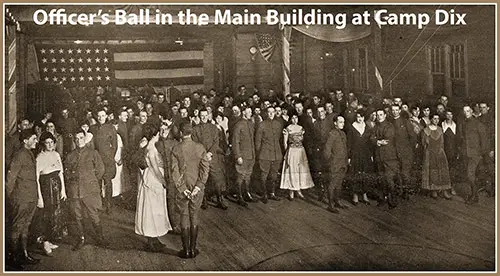
Officer's Ball in the Main Bulding at Camp Dix. Charager Building, 1918, p. 4. GGA Image ID # 1ceb74b783
When the thousands of khaki-clad men stream down the road to Wrightstown, every evening, every Saturday and Sunday, obeying that universal impulse, it is up to the War Camp Community Service to give them or see that the community gives them the things they want.
There are two sides to it. Several soldiers' clubs spring up in adjacent towns, dances and parties are held, with plenty of girls to entertain, and everyone knows the War Camp Community Service does it.
But the most challenging work is the job that is never seen. Nearly as fast as a mushroom grows, Wrightstown became like a western mining town, inhabited by men with a single thought—the eternal quest of gold.
From this motley assemblage, a Board of Trade was organized, with the motto, "Satisfaction Guaranteed," with the result that today the prices of the shops in Wrightstown are as low as any camp community in the country.
Then, after a battle as furious as any on the western front, a sewer system made the town a fit place for soldiers to be in. Finally, the mushroom village became a borough with a Mayor, and cement sidewalks appeared.
Early in the Camp's history, two theatres had sprung up. Very few of the men at Dix ever knew that back of every improvement that came was the patient, silent, prodding effort of the War Camp Community Service, who had had to organize the many conflicting forces and get things done despite almost insurmountable obstacles.
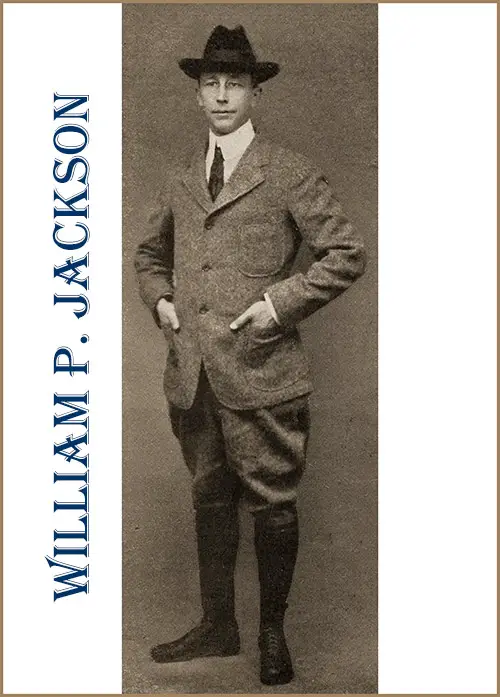
WILLIAM. P. JACKSON - Secretary of the Camp Dix War Camp Community Service
So, in all the communities, as in Wrightstown, the biggest job is the work that no one sees, supplying the spark that will make the communities near the camp do something for the soldiers and organizing and coordinating their efforts so they will count for something.
Home hospitality is one of the finest features of War Camp Community Service. Thousands of homes have opened their doors and hearts to the men in uniform throughout the country, treating any man in khaki as they would their son.
Many soldiers in France have repeatedly written back to their adopted family, and they never forget these intimate reminders of their own homes in distant parts of the country.
The home atmosphere, which soldiers in the camps crave, is also supplied in the several soldiers' clubs in the adjacent communities. In Wrightstown is the Mole-Tequop Soldiers' Club.
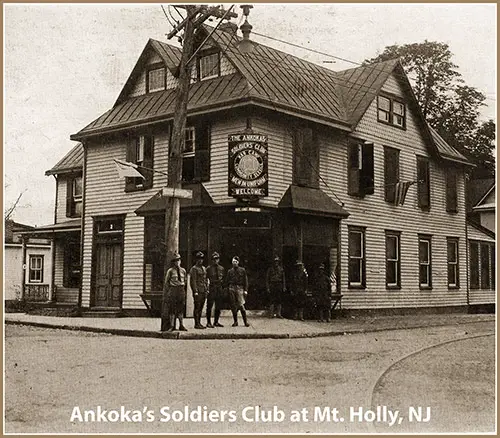
Ankokas Soldiers' Club at Mount Holly, New Jersey, for the Men from Camp Dix. Character Building, 1918, p. 2. GGA Image ID # 1cead522b8
The soldiers of Camp Dix both planned the improvements and did the work on this club. At New Egypt, the soldiers' club is delightfully home-like, and at Mt. Holly, the Ankokas Soldiers' Club is always a magnet for the men from Camp Dix. Pemberton and Bordentown also have soldiers' clubs, and the War Camp Community Service operates a big soldier and sailors' club in Trenton.
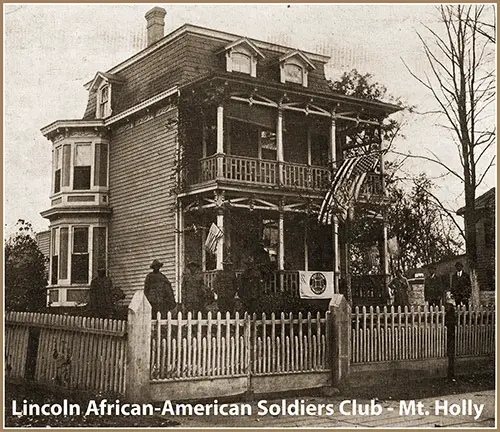
Lincoln African-American Soldiers' Club at Mount Holly, New Jersey. Character Building, 1918, p. 2. GGA Image ID #
The African-American soldiers are not forgotten. A splendid three-story residence in Mt. Holly, with a large lawn and an acre of ground for recreation, was transformed into the Lincoln Soldiers' Clubhouse for African-American troops. Over 300 "jazzbos" enjoyed a big masquerade Hallowe'en party there, at which all the girls appeared in costume.
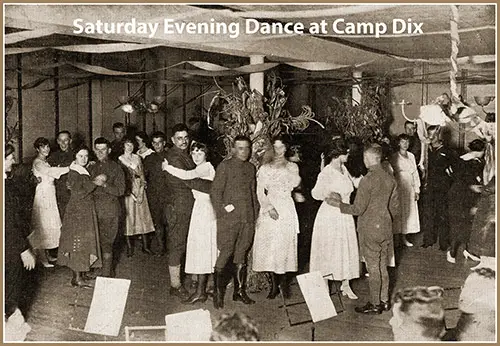
Camp Dix Soldiers Enjoy Dancing in the Clubhouses at Mount Holly, New Jersey. Character Building, 1918, p. 2. GGA Image ID # 1ceb2df5e0
Dancing, the most popular diversion of the soldier, is provided in the clubhouses, and special dances are held Wednesday and Saturday evenings in Mt. Holly.
The War Camp Community Service gives service to the friends and relatives who visit camp through the Travelers' Aid, which works under its direction. A Travelers' Aid representative meets all incoming trains with an automobile and is assisted by many volunteers over the weekends.
During the influenza quarantine, large quantities of fruit, flowers, and preserves were taken into the hospitals by the War Camp Community Service cars.
In all the communities, the War Camp Community Service is the information center for every activity that concerns the men in uniform, and its constant endeavor is to supply that "home touch" which the men in camp miss so much and to make good its slogan: "Surround the Camps with Hospitality."
